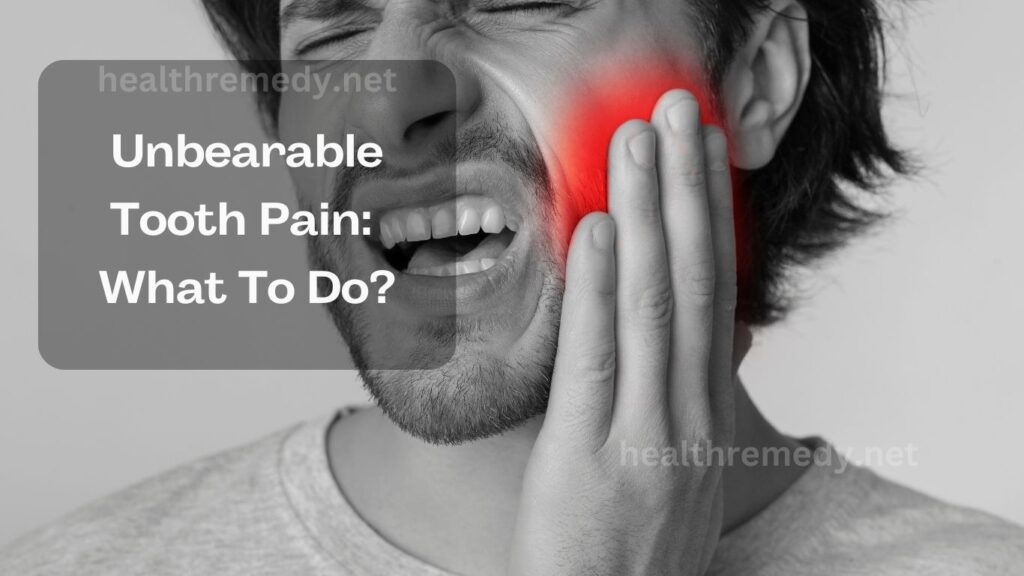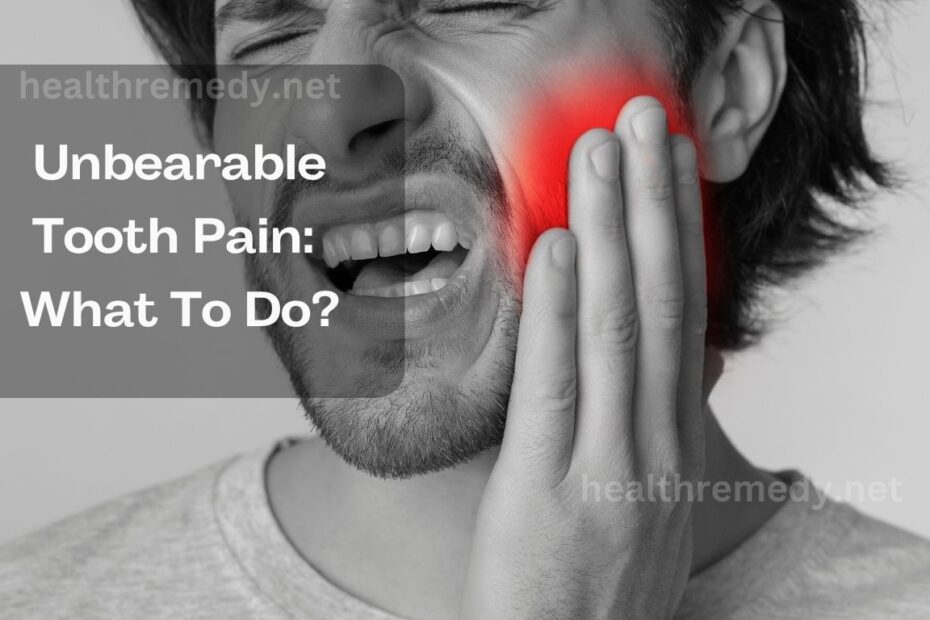When you experience unbearable tooth pain, it’s vital to know what to do to alleviate the discomfort and address the underlying issue. Tooth pain can range from minor, fleeting discomfort to severe, unbearable pain that disrupts your daily life. Recognizing the steps to manage this pain can be incredibly beneficial.

Firstly, understanding the cause of your toothache is essential. The pain could be due to a variety of factors including tooth decay, gum disease, a dental abscess, a cracked tooth, or an impacted tooth. Determining the cause can guide the appropriate response.
Causes of Unbearable Tooth Pain
Unbearable tooth pain is not something that happens without reason. It’s typically a sign that something is wrong with your oral health. Here are some of the common causes:
- Tooth Decay and Cavities: This occurs when the bacteria in your mouth break down the enamel, leading to tiny holes or cavities. If left untreated, the decay can reach the inner layers of the tooth, causing severe pain.
- Tooth Abscess: An abscess is a pocket of pus that forms due to a bacterial infection. An abscessed tooth can cause intense, throbbing pain that can radiate to your jawbone, neck, or ear.
- Gum Disease: Also known as periodontal disease, it involves inflammation and infection of the gums and surrounding tissue. This can cause the gums to pull away from the teeth, forming pockets that can trap food and bacteria, leading to pain.
Understanding these causes can guide you in preventing their onset, thereby avoiding the occurrence of unbearable tooth pain.
Importance of Oral Hygiene in Preventing Tooth Pain
Oral hygiene is the cornerstone of dental health, playing a critical role in preventing tooth pain. Regular brushing and flossing can keep tooth decay and gum disease at bay, both of which can cause severe pain.
- Regular Brushing and Flossing: Brushing twice a day with fluoride toothpaste and flossing daily can help remove plaque, a sticky film of bacteria that forms on the teeth and contributes to decay and gum disease.
- Regular Dental Check-ups: Regular check-ups allow your dentist to detect any potential dental issues early before they become serious. A typical check-up involves a thorough clean, examination of your teeth, gums and mouth, and possibly X-rays to detect hidden problems.
- Maintaining a Healthy Diet: A diet high in sugars and carbohydrates can contribute to tooth decay, while a balanced diet helps to provide the nutrients necessary for good oral health.

Ignoring oral hygiene practices can make you susceptible to conditions causing unbearable tooth pain. Therefore, maintaining good oral hygiene is an investment in your overall health.
Remember, prevention is always better than cure, so let’s make oral hygiene a priority and avoid the agony of unbearable tooth pain.
Home Remedies for Quick Toothpain Relief
When faced with unbearable tooth pain, you may not immediately have access to a dentist. While professional dental treatment should be your ultimate goal, some home remedies can provide temporary relief:
- Cold Compress: Applying a cold pack or ice wrapped in a thin cloth to the affected area can help numb the pain and reduce any swelling. However, it’s crucial not to apply the ice directly to the tooth, as this could lead to more intense pain.
- Over-the-counter Painkillers: Non-prescription painkillers such as ibuprofen can provide temporary relief from tooth pain. It’s important to remember to follow the dosage instructions on the packet.
- Salt Water Rinses: A saltwater rinse can act as a natural disinfectant, helping to loosen food particles and debris stuck in your teeth and can potentially reduce inflammation.
While these remedies can help ease the pain, they’re not long-term solutions. If your tooth pain is persistent or severe, it’s essential to consult a dentist as soon as possible.
Professional Dental Treatments for Tooth Pain
Professional dental treatments are usually necessary to permanently resolve unbearable tooth pain. The type of treatment will depend on the underlying cause of the pain.
- Root Canal Therapy: If your tooth pain is caused by a deep cavity or a cracked tooth, your dentist may recommend a root canal. This procedure involves removing the damaged area of the tooth (pulp), cleaning and disinfecting it, and then filling and sealing it.
- Tooth Extraction: In some cases, the tooth may be too damaged to save, and extraction might be the only option. Your dentist will likely discuss tooth replacement options with you if this is the case.
- Fillings and Crowns: If tooth decay has led to a cavity, your dentist will remove the decay and fill the hole with a material like resin, porcelain, or amalgam. If the decay or fracture has damaged a significant portion of your tooth, a crown might be needed to restore the tooth’s shape, size, and function.
Post-treatment Care for Tooth Pain
After undergoing professional treatment for tooth pain, it’s critical to take good care of your oral health to facilitate healing and prevent future problems.
- Proper Oral Hygiene Practices: Brushing twice a day and flossing once daily should be non-negotiable, even after treatment. If brushing is uncomfortable after a dental procedure, using an antiseptic mouthwash can help keep your mouth clean.
- Follow-up Appointments: You should attend all follow-up appointments with your dentist to ensure your mouth is healing well and there are no complications.
- Adjusting Eating Habits: You may need to avoid certain foods and drinks that can cause discomfort or harm your teeth post-treatment. Your dentist can provide specific dietary guidelines based on your situation.
While these remedies and treatments can provide relief and solutions to tooth pain, prevention is always the best approach. In the next section, we’ll look at how you can prevent future tooth pain from occurring.
Prevention of Future Tooth Pain
Preventing tooth pain is not just about avoiding discomfort; it’s also about preserving your oral and overall health. The key to preventing toothaches is maintaining excellent oral hygiene and adopting healthy habits. Here are some guidelines to follow:
- Regular Dental Visits: Regular dental check-ups and cleanings can help detect potential issues early before they become serious and painful. Your dentist can also provide personalized advice based on your specific oral health needs.
- Proper Brushing and Flossing Techniques: Brushing twice a day with fluoride toothpaste and flossing at least once a day can help prevent the build-up of plaque that leads to tooth decay and gum disease. It’s essential to use the correct techniques to ensure your teeth and gums are cleaned effectively.
- Avoiding Harmful Habits: Habits such as smoking and excessive alcohol consumption can damage your oral health and lead to painful conditions. Limiting these habits, or better yet, quitting them altogether can significantly decrease your risk of developing tooth pain.
Emergency Dentist: When and Why You Might Need One
Even with the best oral hygiene practices, emergencies can still occur. Unbearable tooth pain is often a sign that you need to seek immediate professional help. Understanding when and why you might need an emergency dentist can save you from unnecessary suffering and potentially prevent more serious complications.
- Recognizing Dental Emergencies: Not every toothache requires an emergency dental visit, but there are signs that indicate immediate attention is necessary. Unbearable pain, excessive bleeding, loose or knocked-out teeth, swelling in the face or gums, and signs of infection like fever and severe discomfort all warrant an emergency dental visit.
- Steps to Take Before Getting to the Dentist: While waiting for your emergency dental appointment, there are a few things you can do to manage your pain. These can include rinsing your mouth with warm salt water, using a cold compress on the outside of your cheek, and taking over-the-counter pain medication. Avoid putting aspirin or other painkillers directly on the gums near the aching tooth, as it may burn your gum tissue.
The Psychological Impact of Tooth Pain
Unbearable tooth pain can affect more than just your physical health; it can have significant psychological impacts as well. Managing these aspects is a crucial part of the overall treatment.
- Sleep Disturbances: Severe tooth pain can cause sleep disturbances, making it difficult for you to fall asleep or stay asleep. Lack of quality sleep can lead to issues like impaired cognitive function and mood disorders, such as irritability and depression.
- Anxiety and Stress: The persistent nature of tooth pain can lead to increased stress and anxiety levels, especially if you’re worried about the cause of the pain or the potential for invasive dental procedures. Chronic stress can negatively impact various aspects of your health, so it’s important to discuss these concerns with your dentist or a mental health professional.
Understanding the comprehensive impacts of tooth pain can help ensure you’re not just treating the symptom but also addressing its broader effects on your wellbeing.
Alternative Therapies for Tooth Pain
While professional dental care is necessary for most instances of unbearable tooth pain, some alternative therapies may provide temporary relief or complement traditional treatment methods. Always consult with your dentist before trying any new treatments to ensure they’re safe for your specific situation.
- Acupuncture: This traditional Chinese medicine technique involves inserting very thin needles into specific points on the body to alleviate pain and treat various physical, mental, and emotional conditions. Some research suggests acupuncture may help relieve dental pain, but more studies are needed to fully understand its effectiveness and applicability.
- Essential Oils: Certain essential oils, such as clove oil, have been used for centuries to provide temporary relief from toothache. Eugenol, a compound found in clove oil, has natural anesthetic and antibacterial properties. However, it’s important to use these oils safely. They should be diluted and not applied directly to the gums or swallowed. It’s also crucial to remember that while they may offer short-term relief, they are not a substitute for proper dental care.
Always remember, alternative therapies can complement but not replace professional dental care. Any persistent or unbearable tooth pain requires attention from a dentist. These practitioners have the training and tools necessary to diagnose and treat the underlying issues causing the pain. The proper combination of professional care, at-home treatments, and potentially, alternative therapies, can help you effectively manage and ultimately resolve unbearable tooth pain.
In conclusion, dealing with unbearable tooth pain is a comprehensive process. Understanding the cause, seeking immediate help, considering the psychological impacts, exploring alternative therapies, and prioritizing preventative measures are all part of an effective approach. By adopting these practices, you can ensure your oral health is taken care of, preventing the onset of unbearable tooth pain in the future.
Sources
- American Dental Association. (2020). Toothaches.
- Mayo Clinic. (2020). Cavities and tooth decay.
- National Health Service (UK). (2020). Toothache.
- American Association of Endodontists. (2020). Cracked Teeth.
